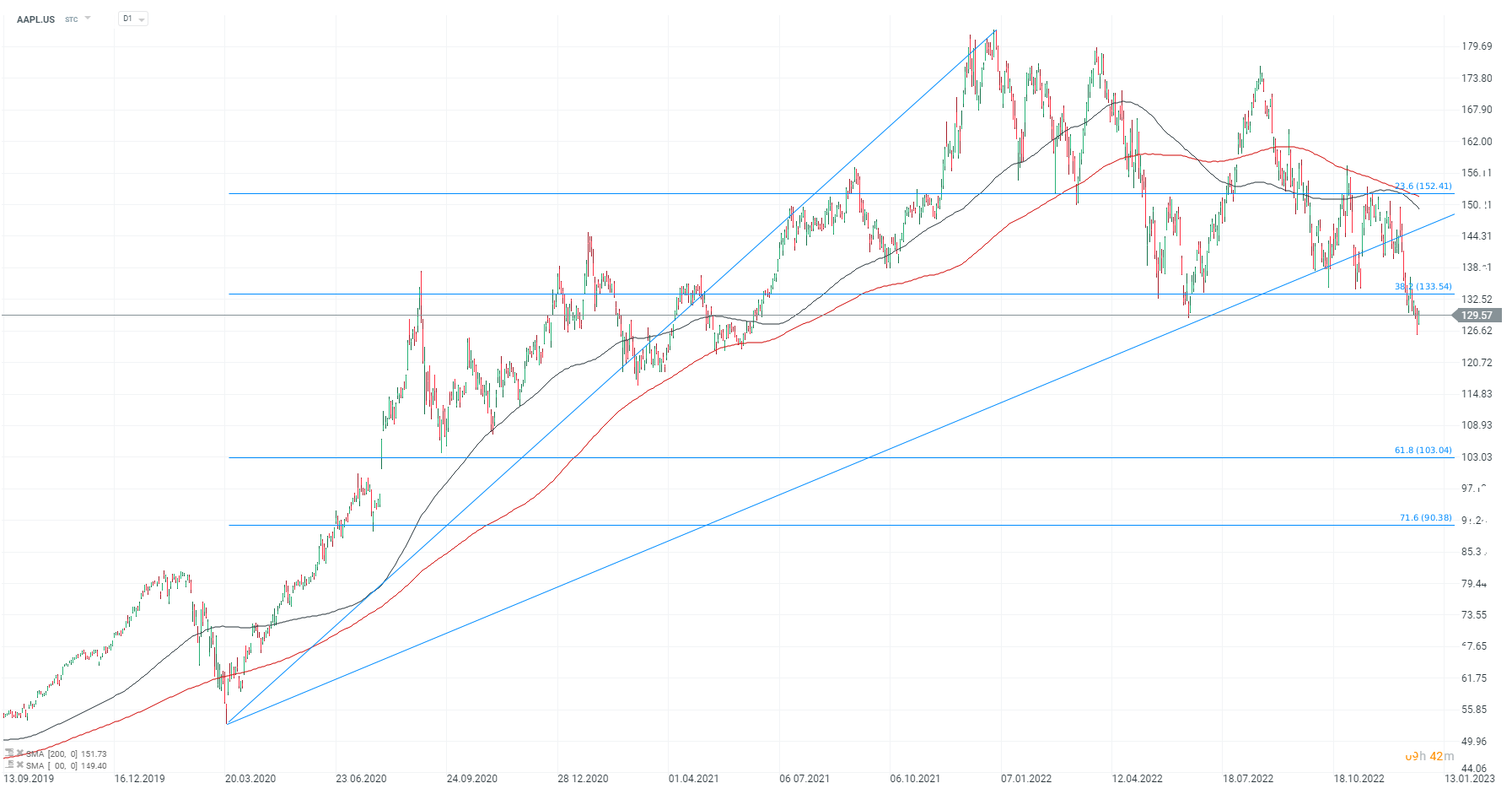- CNBC TV reported citing government sources that Apple (AAPL.US) wants China's BYD Electronics to be able to enter into a joint venture with the Indian company to move iPad production to India;
- Apple has the highest weighting of all U.S. companies due to its largest capitalization of nearly $2.06 trillion, making declines in the company's stock carry negative consequences for major Wall Street benchmarks (weighting 5.94% in the S&P500, 11.6% in the NASDAQ);
- Apple's share price settled below the 200-session moving average and the trend line drawn from the March 2020 lows and tested one-year lows, recording a nearly 13% decline in December. Yesterday's rebound failed to push the price above $130, with the stock losing more than 1% before the market open.
Analysts at Miller Tabak point out that the coming weeks could prove crucial for the company and determine the behavior of its stock price during the rest of the new year. They pointed to the $130 level as key because it coincides with the June low, which also proved to be a local 'low' on the indexes. A sustained price break below this level could result in a search for much lower valuation levels for the company. The main concern for investors remains the health of China's economy and the pandemic spreading through the country, which, combined with the company's planned, costly relocation of production, is at least a short-term risk factor for shareholders. In addition to worries about supply and production delays, concerns about demand for the company's relatively expensive products remain, in an era of higher interest rates making debt financing more difficult, inflation and recessionary prospects.
JP Morgan analysts indicated that they had lowered expectations around Apple's performance in the last quarter of 2022 and Q1 2023 in the face of recurring supply chain problems and complications at its 'iPhone city' factory, in Zhengzhou. Although lead time extensions for the new iPhone 14 Pro / Pro Max models have slowed (they have begun to decline in recent weeks), they remain elevated relative to the pre-pandemic period. JP Morgan still sees the supply problem continuing from the beginning of the year and potentially affecting the typical seasonal increase in iPhone sales that investors have seen during the holiday season, in previous years;
Apple's stock has been losing ground this year despite being seen as a 'safe investment' with a steady stream of recurring revenue from products and services. The company managed to 'beat' the average of the NASDAQ index in 2022, losing 28% against 34% declines in the index. On the fundamental side, Apple's shares are still valued relatively high (albeit much cheaper than they were at the beginning of the year), with a C/Wk at 40 pts vs. an average of 5 pts for the S&P 500 index. Price to book value also has another justification in terms of brand recognition, the value of its logo and its products so it should not be a key indicator in this case. Looking at the P/E ratio, we see a level of 21 points, which looks attractive against an average of 27 points for the S&P 500 and 22 points for NASDAQ companies. The PEG ratio, propagated by Magellan Fund manager Peter Lynch, also looks favorable. The PEG ratio for Apple is 1.61 points against the index average of 2.1, which could potentially indicate investors' estimate of the company's overly pessimistic momentum. However, looking at the debt-to-asset ratio, it is 1.95 well above the company's historical average of 1.46. Apple's current debt-to-asset ratio is higher than the average of the S&P 500, where it averages 1.6, and the NASDAQ, where we see a lower average, at around 0.91. On the other hand, however, the company's long-term debt as of September 30 was around $99 billion, down nearly 9.3% year-over-year.
The year 2023 looks uncertain for the company, and until Apple again proves with its financial results that it is still capable of beating analysts' expectations despite the difficult macro environment and problems in China, it seems that supply pressures may persist driving the stock towards lower price levels. Debt to Equity Ratio for Apple. Source; Macrotrends
Debt to Equity Ratio for Apple. Source; Macrotrends
 Apple (AAPL.US) stock price chart, D1 interval. We can see that the price has fallen below the 200-session average (red) and the trendline. The support of the 38.2 Fibonacci elimination of the upward wave initiated in March 2020, near $130, was also breached again. Now the support has become resistance. Source: xStation5
Apple (AAPL.US) stock price chart, D1 interval. We can see that the price has fallen below the 200-session average (red) and the trendline. The support of the 38.2 Fibonacci elimination of the upward wave initiated in March 2020, near $130, was also breached again. Now the support has become resistance. Source: xStation5

Live Trading - 2026.02.10.

🌍 Gyorsjelentési szezon az XTB-vel

🌍 Gyorsjelentési szezon az XTB-vel

Talpra Tréder - 2026.02.09.
Ezen tartalmat az XTB S.A. készítette, amelynek székhelye Varsóban található a következő címen, Prosta 67, 00-838 Varsó, Lengyelország (KRS szám: 0000217580), és a lengyel pénzügyi hatóság (KNF) felügyeli (sz. DDM-M-4021-57-1/2005). Ezen tartalom a 2014/65/EU irányelvének, ami az Európai Parlament és a Tanács 2014. május 15-i határozata a pénzügyi eszközök piacairól , 24. cikkének (3) bekezdése , valamint a 2002/92 / EK irányelv és a 2011/61 / EU irányelv (MiFID II) szerint marketingkommunikációnak minősül, továbbá nem minősül befektetési tanácsadásnak vagy befektetési kutatásnak. A marketingkommunikáció nem befektetési ajánlás vagy információ, amely befektetési stratégiát javasol a következő rendeleteknek megfelelően, Az Európai Parlament és a Tanács 596/2014 / EU rendelete (2014. április 16.) a piaci visszaélésekről (a piaci visszaélésekről szóló rendelet), valamint a 2003/6 / EK európai parlamenti és tanácsi irányelv és a 2003/124 / EK bizottsági irányelvek hatályon kívül helyezéséről / EK, 2003/125 / EK és 2004/72 / EK, valamint az (EU) 2016/958 bizottsági felhatalmazáson alapuló rendelet (2016. március 9.) az 596/2014 / EU európai parlamenti és tanácsi rendeletnek a szabályozási technikai szabályozás tekintetében történő kiegészítéséről a befektetési ajánlások vagy a befektetési stratégiát javasló vagy javasló egyéb információk objektív bemutatására, valamint az egyes érdekek vagy összeférhetetlenség utáni jelek nyilvánosságra hozatalának technikai szabályaira vonatkozó szabványok vagy egyéb tanácsadás, ideértve a befektetési tanácsadást is, az A pénzügyi eszközök kereskedelméről szóló, 2005. július 29-i törvény (azaz a 2019. évi Lap, módosított 875 tétel). Ezen marketingkommunikáció a legnagyobb gondossággal, tárgyilagossággal készült, bemutatja azokat a tényeket, amelyek a szerző számára a készítés időpontjában ismertek voltak , valamint mindenféle értékelési elemtől mentes. A marketingkommunikáció az Ügyfél igényeinek, az egyéni pénzügyi helyzetének figyelembevétele nélkül készül, és semmilyen módon nem terjeszt elő befektetési stratégiát. A marketingkommunikáció nem minősül semmilyen pénzügyi eszköz eladási, felajánlási, feliratkozási, vásárlási felhívásának, hirdetésének vagy promóciójának. Az XTB S.A. nem vállal felelősséget az Ügyfél ezen marketingkommunikációban foglalt információk alapján tett cselekedeteiért vagy mulasztásaiért, különösen a pénzügyi eszközök megszerzéséért vagy elidegenítéséért. Abban az esetben, ha a marketingkommunikáció bármilyen információt tartalmaz az abban megjelölt pénzügyi eszközökkel kapcsolatos eredményekről, azok nem jelentenek garanciát vagy előrejelzést a jövőbeli eredményekkel kapcsolatban.


